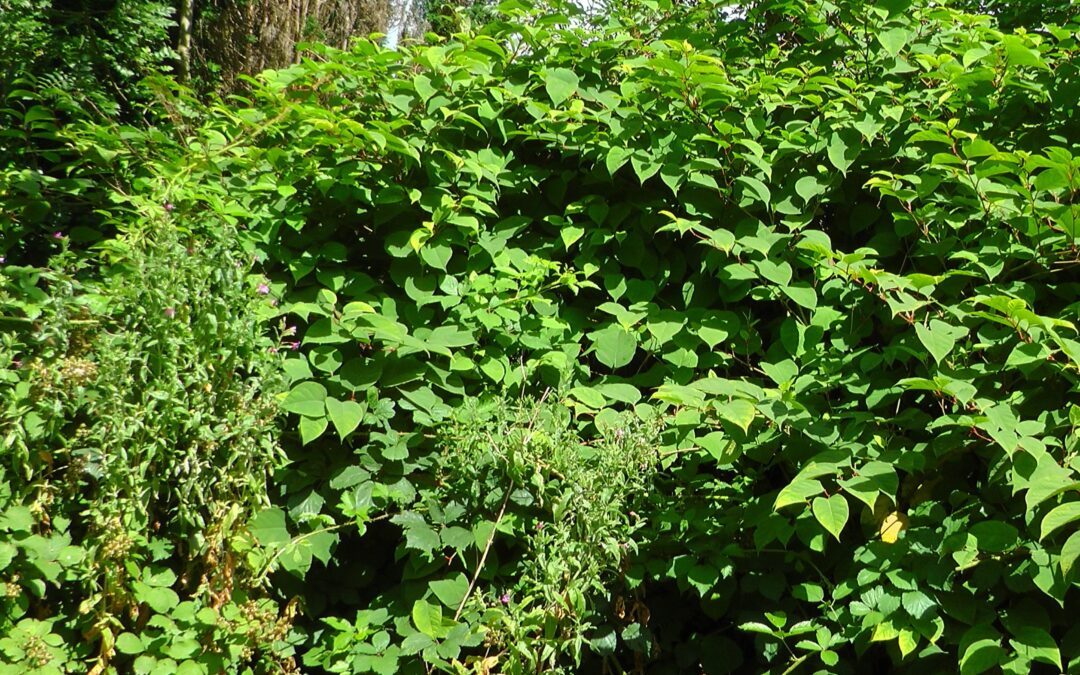What are the benefits of Japanese knotweed?
Japanese knotweed has some benefits, such as providing habitat for wildlife, food, and medicine. Japanese knotweed (Fallopia japonica) is an invasive plant native to East Asia. Although it can be a nuisance and even a danger to infrastructure, it does have some benefits. Here are a few examples:
Ecological: Japanese knotweed can provide a habitat for wildlife, especially insects, birds, and small mammals.
Food and Medicine: The plant’s young shoots can be consumed as a vegetable. It has been traditionally used in Asia as a herbal remedy for conditions such as diarrhoea, haemorrhoids, and high blood pressure.
Soil stabilisation:
The deep roots of Japanese knotweed can help stabilise soil on steep slopes and river banks, preventing erosion. The plant’s extensive root system can penetrate deep into the soil, providing a strong anchor that helps to hold soil in place, especially on steep slopes and river banks. This can help prevent soil erosion and the associated loss of valuable topsoil.
The root system of Japanese knotweed
is particularly well suited for soil stabilisation due to its dense, fibrous nature. Moreover, it can grow in a wide range of soils and conditions. The roots can help to bind the soil particles together. Creating a solid matrix that resists erosion and holds soil in place. Even in the presence of flowing water or heavy rainfall.
In addition to soil stabilization. The deep roots of Japanese knotweed can also help to improve soil structure by breaking up compacted soil. In turn, improving water infiltration. Furthermore this can help to promote healthy plant growth and support the recovery of degraded landscapes.
Japanese knotweed can help stabilize However, it’s important to remember that the deep roots of Japanese knotweed can help stabilize the soil. Moreover the plant itself can also cause significant harm to native ecosystems and wildlife. It’s important to carefully consider the potential benefits and drawbacks of using Japanese knotweed for soil stabilization. Before deciding to use the plant for this purpose.
Phytoremediation
Japanese knotweed effectively removes heavy metals and other pollutants from contaminated soil, making it a useful tool in phytoremediation projects. Phytoremediation is the use of plants to clean up contaminated soil, water, and air. It is a form of environmental remediation that utilizes the natural abilities of plants to remove, degrade, or contain environmental pollutants, including heavy metals, organic compounds, and radionuclides.
Phytoremediation can take several forms, including:
- Phytoextraction: The use of plants to remove contaminants from soil and water, typically through the uptake of pollutants into the plant tissues.
- Phytodegradation: Using plants to break down contaminants in the soil and water into less harmful compounds.
- Phytostabilization: The use of plants to stabilise contaminated soils, preventing the release of pollutants into the environment.
- Rhizofiltration is the use of plants to remove pollutants from water through the uptake of contaminants by the roots.
Phytoremediation is a cost-effective and eco-friendly alternative to traditional remediation methods. It can be used for a wide range of contaminants in different environments. However, to ensure the success of a phytoremediation project, it is important to carefully select the appropriate plants and management strategies.
Carbon sequestration:
Like other plants, Japanese knotweed absorbs carbon dioxide from the atmosphere and stores it in its biomass. Additionally, it can help mitigate the effects of climate change. Carbon sequestration refers to the process of capturing and storing carbon dioxide from the atmosphere. Japanese knotweed, like other plants, plays a role in this process. When plants photosynthesize, they take in carbon dioxide from the air and use it to produce organic matter, which is stored in their stems, leaves, and roots.
This organic matter, known as biomass,
remains stored in the plant or the soil as long as the plant remains alive. Or decomposes very slowly. In this way, carbon dioxide would otherwise be released back into the atmosphere. Instead, it is trapped within the plant material, contributing to carbon sequestration.
In the case of Japanese knotweed.
Its fast growth rate, large size, and long lifespan make it a potentially significant contributor to carbon sequestration. Studies have shown that Japanese knotweed can sequester substantial amounts of carbon in a relatively short period. They are making it a valuable tool in the fight against climate change.
Additionally, it’s important to note that Japanese knotweed can help with carbon sequestration. It is still considered invasive in many countries, including the UK. And can have negative impacts on native ecosystems and wildlife. Therefore, it’s essential to manage Japanese knotweed populations responsibly. Moreover, it balances its potential benefits with the risks it poses to the environment.
It’s important to note that despite these benefits, Japanese knotweed is considered an invasive species. It can cause significant damage to infrastructure, outcompete native plant species, and negatively impact ecosystems. Therefore, weighing the potential benefits against the risks is essential before deciding its use.
Furthermore, Japanese knotweed can be used in food, but it should be consumed with caution. The plant is known to contain high levels of resveratrol, a compound with potential health benefits.
However, Japanese knotweed also contains compounds that can be toxic in high doses. So, it is important to properly prepare and cook the plant before consuming it. The plant should also be harvested from areas that are free from contamination and away from roadsides and other sources of pollution.
Therefore, it is recommended that you consult with a qualified health professional before consuming Japanese knotweed, especially if you have any pre-existing health conditions. Moreover, it is also important to follow proper food safety guidelines and to consume the plant only in moderation.
